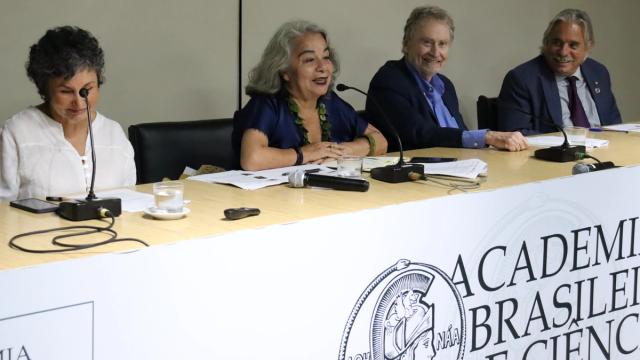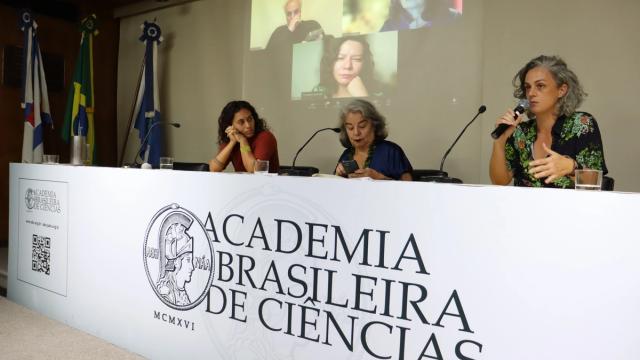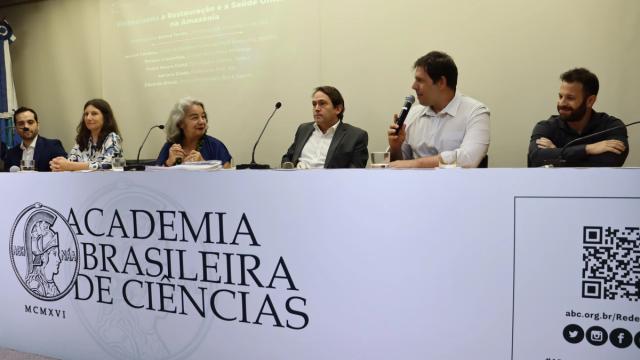Financing Conservation, Restoration, and Advancing the One Health Approach in the Amazon
On November 21, 2024, the Science Panel for the Amazon (SPA), in partnership with the Brazilian Academy of Sciences (ABC), the Pontifical Catholic University of Rio de Janeiro (PUC-Rio), and the Oswaldo Cruz Foundation (Fiocruz), hosted a pivotal conference at the Brazilian Academy of Sciences in Rio de Janeiro. Held during COP29 and the G20 meetings, the event, titled “Financing Conservation, Restoration, and Advancing the One Health Approach in the Amazon,” brought together policymakers, researchers, private sector leaders, and scientists to explore solutions for conservation, restoration, and health in the Amazon region.
The seminar also marked the launch of two SPA Policy Briefs, “Health in the Amazon: Environmental, Social, and Economic Challenges” and “Strategies for Implementing Large-Scale Forest Restoration in the Amazon.” Participants discussed the key findings of the policy briefs, including the interconnection between Amazonian ecosystems and human health and the financial mechanisms necessary to achieve large-scale restoration and sustainable development in the region.
Opening Remarks
Emma Torres, Strategic Coordinator of the SPA, opened the event by emphasizing the Amazon's global importance as a biodiversity powerhouse. She introduced the panelists and underscored the urgency of the challenges addressed in the policy briefs.
Luis Davidovich, former President of the Brazilian Academy of Sciences and member of the SPA’s Strategic Committee, exemplified the Amazon’s bioeconomy potential as a "new oil" plant species, emphasizing its role in driving sustainable development while preserving the region’s ecosystems.
Paulo Gadelha, Coordinator of Fiocruz’s Strategy for the 2030 Agenda, highlighted the integrated One Health approach, noting that the health and well-being of Amazonian communities are intrinsically linked to preserving its socio-biodiversity.
Nilza Rogeria Nunes, Coordinator of the Extension Research Project on Health in the Amazon at PUC-Rio, stressed the importance of combining scientific research with local knowledge to address health challenges and foster a development model centered on well-being.
Key Insights from the Policy Briefs
Health and Environmental Challenges in the Amazon
Ylana Rodrigues, author of the One Health Policy Brief, highlighted the cascading impacts of environmental degradation and climate change on health systems in the Amazon. She noted that vulnerable communities face deteriorating infrastructure, sanitation crisis, and increasing risks of infectious diseases.
Key recommendations included:
- Addressing social inequalities, with a focus on marginalized groups;
- Strengthening health systems and sanitation, particularly in remote and underserved areas.
- Prioritizing Indigenous, local, and remote communities in health policy development;
- Designing and urgently implementing climate adaptation and mitigation plans to safeguard health and well-being;
- Reducing the risk of emerging infectious diseases through improved health infrastructure and monitoring systems;
- And promoting restoration, conservation, and sustainable food systems as key components of health and environmental resilience.
Scaling Up Forest Restoration
Catarina Jakovac, lead author of the restoration-focused brief, warned of the Amazon’s potential ecosystem collapse and outlined strategies for large-scale restoration, including:
- Conserving and protecting primary and secondary forests while promoting natural regeneration in less-degraded landscapes;
- Developing seed and seedling supply chains for native species to enhance restoration efforts;
- Strengthening Amazonian socio-bioeconomy to create sustainable livelihoods;
- Promoting engagement, capacity building, and knowledge integration with Indigenous Peoples and local communities;
- Enhancing public policies and governance to support effective restoration initiatives;
- And securing flexible financing mechanisms to ensure all stages of restoration are adequately supported.
Insights from SPA Co-Chairs and Panel Discussion
Carlos Nobre, SPA Co-Chair, highlighted the Amazon's critical risk of crossing a tipping point, where further degradation could lead to the collapse of around 70% of the ecosystem by 2100. He said that the record droughts of 2024 are a direct consequence of human activity and climate change. According to Nobre, the Amazon is approaching a "point of no return," with the ongoing destruction exacerbating extreme weather events. He also added that while deforestation in the Amazon has decreased in recent years, wildfires caused by humans and forest degradation have significantly increased compared to previous years, posing an even more significant threat to the region's resilience.
Marielos Peña-Claros, SPA Co-Chair, emphasized the need for multisectoral collaboration, with the SPA playing a pivotal role in integrating scientific knowledge, traditional wisdom, and international cooperation to address Amazon's challenges. She highlighted the "Arcs of Restoration" as a framework that has shaped Brazil's restoration efforts and funding mechanisms by institutions like Brazilian National Development Bank (BNDES). Peña-Claros also noted the SPA's advocacy with the Andean Parliament to declare the Amazon an emergency zone due to deforestation and its ongoing dialogue with the financial sector to promote sustainable practices.
Rodrigues and Jakovac were joined by Nathália Nascimento, a lead author of the restoration policy brief, for a panel discussion. They highlighted the global health impacts of Amazon degradation, stressing that pollution and disease risks in the region affect not only the Amazon but also global health. They emphasized that ecosystem restoration is crucial for climate stability and public health, and they underscored the importance of respecting Indigenous and local communities' health perspectives, rooted in the concept of "bem viver" — a holistic view of well-being tied to nature and territory. Nascimento also highlighted the need to listen to these communities to address health and environmental challenges effectively, and called for more inclusive and culturally respectful approaches in policy-making and carbon credit mechanisms.
Financing and Implementation: Expert Perspectives
A diverse panel of financial investors offered solutions for overcoming financial and implementation challenges in conservation and restoration.
Marcus Cardoso (BNDES) shared the bank’s ambitious goal of restoring and conserving up to 6 million hectares of the Amazon by 2030, with an investment of $10 billion towards active restoration. He emphasized the need for stronger public-private partnerships to scale restoration efforts and expand the standing forest bioeconomy. Cardoso also highlighted using the Fundo Amazônia as a key financing mechanism, noting its low-risk return of 1% annually. He mentioned the allocation of $1.45 million from the Fundo Amazônia to approved projects such as Monbak and Regreen, which align with the bank’s restoration strategy.
Renato Crouzeilles (Mombak) discussed the importance of public-private partnerships, “blended finance,” and innovative financial mechanisms in addressing health and climate crises. He pointed out the challenges of scaling isolated successful projects and emphasized the need for cooperative and consortium-based approaches to pool resources and achieve large-scale restoration. Crouzeilles stressed that integrating restoration with the bioeconomy and involving local communities, is key to creating structural transformation. He also emphasized the critical role of the private sector and sustainable financing in supporting these efforts.
Pedro Moura Costa (BVRio and SPA Lead Author) critiqued the current carbon credit market, describing it as ineffective in supporting large-scale restoration projects, particularly those that do not generate direct revenue. He emphasized the need for innovative financing mechanisms, suggesting state-led public-private partnerships that include guarantees and direct investments to bridge this gap. Costa also proposed using bilateral agreements between countries, coordinated by effective government action, as a way to scale up restoration efforts. Additionally, he highlighted Article 6.2 of the Paris Agreement as a potential framework to fund restoration initiatives globally, while stressing the importance of dividing funding sources across the different phases of restoration.
Adriana Gioda (PUC-Rio) connected restoration efforts to health benefits, advocating for policies integrating ecological restoration with human well-being. She called for more coordinated policies that strengthen the links between restoration and public health outcomes, promoting environmental sustainability and improved public health in the Amazon.
Eduardo Rimoli (Black Jaguar Foundation) highlighted the importance of involving local communities in restoration initiatives and ensuring robust governance mechanisms that ensure transparency and accountability. He discussed the need for affordable, resilient seedlings (costing less than 3 BRL per seedling) and a strong governance model that guarantees social and environmental accountability. Rimoli stressed that this model of governance is crucial to supporting the social benefits of restoration and strengthening the Amazon’s bioeconomy.
Key Takeaways
The event concluded with reflections on aligning conservation, restoration, and health initiatives in the Amazon. Panelists agreed on pursuing robust financial mechanisms and innovative funding sources to support large-scale projects, scaling up public and private investments while ensuring local community engagement. Strengthening governance frameworks to guarantee accountability and transparency was also highlighted as a critical priority.
Marielos Peña-Claros emphasized the importance of a national restoration program that unites efforts across the Amazon, noting that actions in one country impact others and stressing the role of public-private partnerships. Carlos Nobre underscored the need to connect ecosystem services, ensuring that restoration efforts are integrated into a larger conservation network, vital for long-term sustainability.
Emma Torres stressed the urgency of multisectoral collaboration, calling for increased investments to safeguard the Amazon’s ecosystems while improving the quality of life for its inhabitants. She highlighted the need for urgent action and the role of governance in steering these efforts.
The event also emphasized integrating science, technology, and traditional knowledge as a holistic approach to addressing Amazon’s challenges. By fostering innovative partnerships and leveraging financial mechanisms, stakeholders can work towards a sustainable bioeconomy that prioritizes ecological resilience and human well-being. Held during COP29 and the G20 meetings, the event served as a call to action, showcasing the transformative potential of collaborative, science-based solutions to secure the future of the Amazon.


